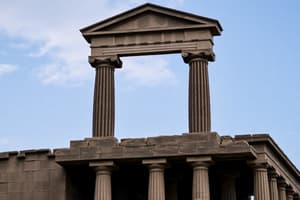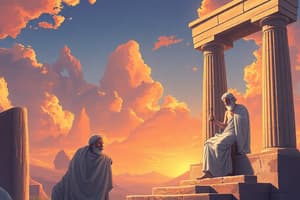Podcast
Questions and Answers
Who is considered the 'Father of Mathematics'?
Who is considered the 'Father of Mathematics'?
Socrates is known for establishing the Milesian School.
Socrates is known for establishing the Milesian School.
False
What did Thales of Miletus believe was essential for the creation of the cosmos?
What did Thales of Miletus believe was essential for the creation of the cosmos?
One element necessary for life
Pythagoras is known for discovering complex relationships between numbers through __________.
Pythagoras is known for discovering complex relationships between numbers through __________.
Signup and view all the answers
Match the philosophers with their contributions:
Match the philosophers with their contributions:
Signup and view all the answers
Which philosopher focused on natural science rather than moral issues?
Which philosopher focused on natural science rather than moral issues?
Signup and view all the answers
Pythagoras used inductive reasoning in his mathematical discoveries.
Pythagoras used inductive reasoning in his mathematical discoveries.
Signup and view all the answers
What influence did Pythagoras have on later philosophers?
What influence did Pythagoras have on later philosophers?
Signup and view all the answers
The Milesian School was founded by __________.
The Milesian School was founded by __________.
Signup and view all the answers
Which element did Thales theorize was fundamental to life and the cosmos?
Which element did Thales theorize was fundamental to life and the cosmos?
Signup and view all the answers
Study Notes
Ancient Greek and Roman Philosophers
- Ancient Greek and Roman philosophers, such as Socrates, Plato, and Aristotle, laid the groundwork for Western philosophy.
- They used reason and logic to explore the cosmos and human morality.
- Their ideas shaped philosophy and science for centuries.
Pre-Socratic Philosophers
Thales of Miletus
- Considered the first Greek philosopher (7th century BC).
- Focused on natural science rather than moral issues.
- A monist, believing the universe was built around one fundamental element.
- Concluded water was the essential element for life and the creation of the universe.
- Established the Milesian school and taught students like Pythagoras.
Pythagoras
- (570 BC) Considered the Father of Mathematics.
- Believed mathematics provided a rational explanation for the universe.
- Discovered complex relationships between numbers through proportions and ratios.
- Studied geometry and made significant advancements in mathematics and architecture.
- Used deductive reasoning, influencing later philosophers like Plato.
- Pythagoreans believed their intellectual breakthroughs were heavenly truths. They associated spiritual meaning with numbers.
The Great Three
Socrates
- A key figure in Western philosophy, known for his devotion to truth, virtue, debate, and martyrdom-like death.
- He was sentenced to death in Athens for philosophical discussions.
- Focused on ethical concerns, viewing the cultivation of virtue as a human being's most crucial obligation.
- Developed the Socratic method, a conversational approach to explore philosophical questions.
- His philosophical beliefs were explored in Plato's early dialogues.
Plato
- A student of Socrates; he created a foundation for ancient Neoplatonism, influencing early Medieval philosophy and Christian theology.
- His ideas influenced 19th-century German idealism and 20th-century process philosophy.
- Proposed a realm of ideal, perfect, and unchanging Forms underlying the physical world, a topic explored in The Republic.
- His philosophical theories were presented in dialogues, with Socrates as the main character.
Aristotle
- Considered one of history's most influential thinkers.
- Contributed to metaphysics, ethics, logic, the philosophy of mind, philosophy of science, political philosophy, and aesthetics.
- Established formal logic (the Syllogistic system of reasoning).
- Differentiated major scientific subjects and pioneered empirical science.
- His philosophy became the framework for later Western Scholasticism.
Other Significant Philosophers
St. Thomas Aquinas
- Developed a Christianized Aristotelianism.
- Systematized philosophy using Aristotelian logic.
- Combined Christian theology and philosophy.
Niccolò Machiavelli
- A Renaissance diplomat and writer who wrote The Prince.
- Focused on political theory and governance, emphasizing pragmatic leadership strategies.
- Argued that rulers might need to use harsh or manipulative methods to achieve success.
- His thoughts on how to manage power have been influential.
René Descartes
- Considered the father of modern philosophy.
- Introduced new ideas about science, the mind, and knowledge.
- Developed a scientific approach based on mechanical principles.
- Introduced dualism (mind and body).
- Known for systematic doubt as part of his search for knowledge. His works include Meditations.
Jean-Jacques Rousseau
- Influenced the French Revolution;
- Believed societal advancements led to moral decline, not betterment.
- Recognized the importance of human morality and the need for greater societal equality.
- Viewed government based on varying levels of inequality.
Immanuel Kant
- Revolutionized Western philosophy.
- Emphasized human reason.
- Focused on the powers and limitations of human reason.
- Developed the notion of the categorical imperative, emphasizing moral duties.
Karl Marx
- Developed a framework for analyzing class, society, and power dynamics with Friedrich Engels.
- Believed capitalism's inequalities would lead to a socialist system and a classless society.
- His theories impacted social and political movements.
Friedrich Nietzsche
- Influenced 20th-century thought through his critical assessment of Western philosophy, religion, and morality.
- Presented controversial ideas such as the "will to power," the death of God, and the "Übermensch" (superman).
- His aphoristic and poetic writing style made him influential.
Jean-Paul Sartre
- Prominent figure in existentialism.
- Emphasized the importance of individual freedom and responsibility.
- Believed humans are responsible for creating their own meaning and essence in an otherwise meaningless world.
Michel Foucault
- Analyzed power and knowledge within social contexts.
- Examined the ways institutions like schools, prisons, and hospitals maintain social order.
- His ideas on power's operation have influenced discussions on social justice and human rights, continuing to impact thought.
Studying That Suits You
Use AI to generate personalized quizzes and flashcards to suit your learning preferences.
Related Documents
Description
Explore the ideas and contributions of ancient Greek and Roman philosophers, including Socrates, Plato, and Aristotle. Learn how their reasoning and theories shaped the foundations of Western philosophy and science, starting from early thinkers like Thales and Pythagoras.



![[POLSC 122 - R1] Ancient Political Philosophy Overview](https://images.unsplash.com/photo-1550776713-e562db9788d0?crop=entropy&cs=srgb&fm=jpg&ixid=M3w0MjA4MDF8MHwxfHNlYXJjaHwxNXx8UGxhdG8lMjBUaGUlMjBSZXB1YmxpYyUyMHBoaWxvc29waHklMjBjbGFzc2ljc3xlbnwxfDB8fHwxNzA5OTUzNTIzfDA&ixlib=rb-4.0.3&q=85&w=300&fit=crop&h=200&q=75&fm=webp)
